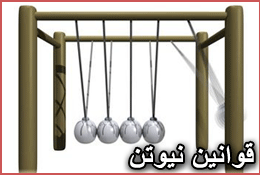Lower Intermediate - Newton's laws

In today's Arabic/Physics podcasts, we go through the laws of Newton. These laws are widely taught to Arab children and contain plenty of useful vocabulary so make sure you don't miss this one.


|
Desmond says

Sun 29th May 11@05:00 pm
I think the most interesting word in this lesson is “yadhull” (ﻴﻈﻝ
 , which appears at the beginning of the first sentence. This is a present tense form of “dhalla” (ﻈﻝ , which appears at the beginning of the first sentence. This is a present tense form of “dhalla” (ﻈﻝ – one of the more elusive of the twelve sisters of “kaana”. It isn’t easy to find information about these verbs on the Net. They are mentioned briefly by authors like Ambros and Ryding, and they have been discussed by the Russian linguist who is responsible for the desert-sky.net website. Ryding cites some sources in her footnotes, but the works she mentions are not Google books. Surprisingly, there are only a few scraps of information on French websites, but there is more on Spanish websites. You have to key in “kana y sus hermanas” in order to find these sites. I hope Ehab will reinintroduce “dhalla” (ﻈﻝ – one of the more elusive of the twelve sisters of “kaana”. It isn’t easy to find information about these verbs on the Net. They are mentioned briefly by authors like Ambros and Ryding, and they have been discussed by the Russian linguist who is responsible for the desert-sky.net website. Ryding cites some sources in her footnotes, but the works she mentions are not Google books. Surprisingly, there are only a few scraps of information on French websites, but there is more on Spanish websites. You have to key in “kana y sus hermanas” in order to find these sites. I hope Ehab will reinintroduce “dhalla” (ﻈﻝ in some other lessons so that we can see exactly how it functions. in some other lessons so that we can see exactly how it functions.
|
|
مستقيم" to find this word from surah alfatiha in the work done in our time, is fascinating, at last a use my quranic vocabs in the hustle of bustle of the nearest- life.thanks guys.
|
|
“Dhalla” (ﻈﻝ
 is used several times in the Qu’ran. A search of the Quranic Arabic Corpus of the University of Leeds shows that this verb has several meanings (e.g. “remain”, “become” and “continue”). It would be interesting to find out how many meanings “dhalla” (ﻈﻝ is used several times in the Qu’ran. A search of the Quranic Arabic Corpus of the University of Leeds shows that this verb has several meanings (e.g. “remain”, “become” and “continue”). It would be interesting to find out how many meanings “dhalla” (ﻈﻝ has in MSA. has in MSA.
|
|
My observations about the doubled verb ظلّ.
Doubled verbs have the same second and third root letter. Most of the times, when a form 1 doubled verb is conjugated in the present tense, the short vowel of the first root letter is U. ردّ (= to reply) radda / yarudd Occasionally, it is I, instead of U. شدّ (= to strengthen, to pull, to tighten) shadda / yashidd Very very rarely, it is A instead of U or I. Three such verbs are, عضّ (= to bite) 3a9’9’a / ya3a9’9’ ودّ (= to want, to wish, to like) wadda / yawadd ظلّ (= to remain, to stay, to continue) 6’alla / ya6’all And it is interesting to note that, مظلَّة (mi6’alla) (= umbrella) and the verb ظلّ have the same root! |
|
@ vinod
ﻤﻈﻠﺔ (midhalla) comes from ﻈﻝ (dhill), which means “shadow”, ﻈﻝ (dhalla) sometimes means “continue”, and a shadow might be considered as a continuation of the object that casts it. Perhaps that is why ﻈﻝ (dhill) and ﻈﻝ (dhalla) look and sound so similar. The fact that “dhalla” is a geminate verb has not escaped me. Most Arabic grammars devote a chapter to the irregularities displayed by these words. |
|
Phew, I'm getting flashbacks to my university & schooldays! A small but important point is that it should really be 'a body' or 'every body', not everybody as the latter refers exclusively to people, whereas the law, of course, includes all types animate or inanimate objects.
In terms of physics, nowadays, compared to Newton's time, the word object or mass would probably more commonly be used in place of the word body, except as a historical quote. Newton was a fascinating character as, besides his more well known studies, he also devoted a great deal of his time to philosophy and metaphysics (including alchemy and astrology, not just astronomy), as well as being in charge of the Royal Mint during a turbulent political time. He also had a long running debate/dispute with Gottfried Leibniz, another remarkable philosopher-scientist. |
|
This is pretty difficult for a lower intermediate lesson!
|